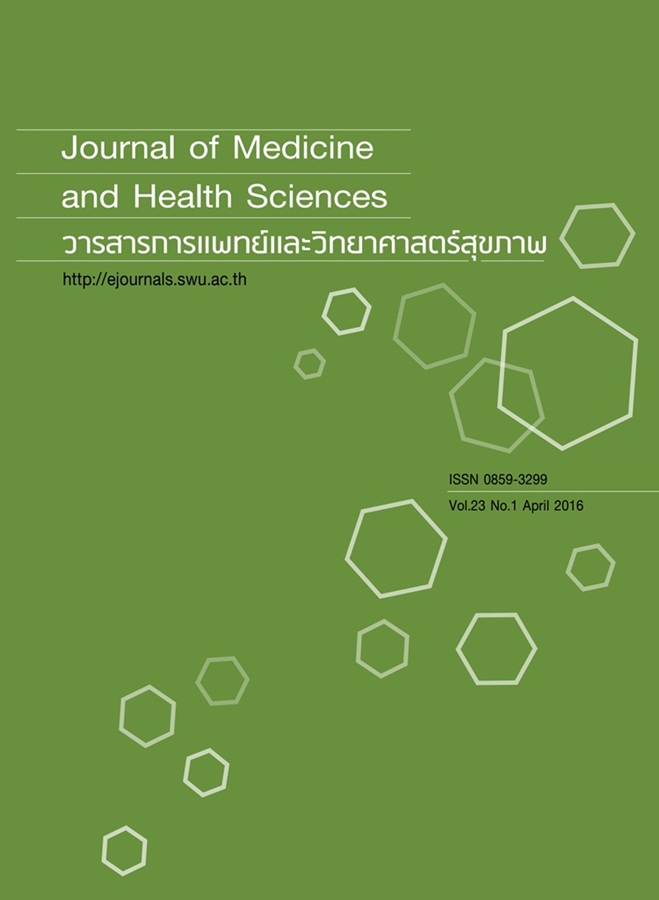Therapeutic monoclonal antibody for dengue treatment
Keywords:
โมโนโคลนอลแอนติบอดีเพื่อการรักษาโรค, เชื้อไวรัสเดงกี่, ไข้เลือดออก, การทำให้เชื้อหมดความสามารถ, การส่งเสริมให้โรครุนแรงขึ้นจากแอนติบอดี, therapeutic monoclonal antibody, Dengue virus, haemorrhagic fever, neutralization, antibody dependent enhancementAbstract
Dengue disease is one of viral diseases caused by dengue virus (DENV) and transmitted by Aedes aegypti mosquitoes. There are over 100 million cases of dengue diseases reported by WHO each year. Among these, about 500,000 cases were developed to severe diseases which are Dengue Hemorrhagic Fever (DHF) and Dengue Shock Syndrome (DSS) causing more than 20,000 deaths. Until now, there is no vaccine or specific treatment for this disease. From its specificity, several researcher groups were trying to develop monoclonal antibody (MAb) as its alternative treatment. However, from the complexity of the virus itself, which can be classified into 4 serologically different serotypes, the antibody that neutralizes one serotype from the primary infection can cross-react, but may not neutralize heterologous serotypes in the secondary infection. Instead, the antibody can form a complex with the virus and help the virus to enter the target cell via IgG Fc receptor. This phenomenon is called antibody dependent enhancement (ADE) which leads to increased virus particles infecting to the cells and is considered as one hypothesis for increasing severity dengue secondary infection. For this reason, the candidate of therapeutic monoclonal antibody for treatment dengue should be able to neutralize 4 serotypes of DENV, without causing ADE. This study provided the information for the development of therapeutic monoclonal antibody for infectious diseases, particularly dengue disease.
โมโนโคลนอลแอนติบอดีสำหรับรักษาโรคไข้เลือดออก
โรคไข้เลือดออกเกิดจากเชื้อไวรัสเดงกี่ (Dengue virus) ซึ่งมียุงลายเป็นพาหะนำโรค จากการรายงานขององค์การ อนามัยโลก (World Health Organization; WHO) พบว่า ทุกปีประชากรจำนวนกว่า 100 ล้านคนทั่วโลกติดเชื้อไวรัสชนิดนี้ ในจำนวนนี้มีผู้ป่วยประมาณ 500,000 คน ที่พัฒนาเข้าสู่ไข้เลือดออกชนิดรุนแรง (Dengue hemorrhagic fever และ Dengue shock syndrome) ส่งผลให้มีอัตราการตายถึงปีละ 20,000 ราย ซึ่งในปัจจุบันยังคงไม่มีวัคซีน หรือยารักษาโรค ที่เฉพาะเจาะจง นักวิจัยหลายกลุ่มจึงพยายามพัฒนาโมโนโคลนอลแอนติบอดี (Monoclonal antibody, MAb) เพื่อเป็นทางเลือกในการรักษา แต่เนื่องจากเชื้อไวรัสเดงกี่มีลักษณะที่แตกต่างกันถึง 4 สายพันธุ์ ทำให้ MAb ที่ยับยั้ง ไวรัสเดงกี่สายพันธุ์หนึ่ง อาจไม่สามารถยับยั้งเชื้อไวรัสเดงกี่สายพันธุ์อื่นได้ แต่กลับส่งเสริมให้เชื้อไวรัสเข้าสู่เซลล์มากขึ้น ผ่านทางตัวรับ Fc (Fc receptor) ของ immunoglobulin G (IgG) เป็นสาเหตุให้เกิดความรุนแรงของโรค ซึ่งเป็นทฤษฎี การเกิดโรคของไข้เลือดออกชนิดหนึ่งที่เรียกว่า antibody dependent enhancement (ADE) มักจะเกิดในคนไข้ที่มีการ ติดเชื้อซ้ำ (secondary infection) จึงเป็นปัญหาสำคัญในการพัฒนา MAb เพื่อการรักษาโรคไข้เลือดออก ซึ่งจำเป็นต้อง มีความสามารถในการยับยั้งเชื้อไวรัสเดงกี่ได้ทั้ง 4 สายพันธุ์ และไม่ก่อให้เกิด ADE ดังนั้น การผลิตและพัฒนา MAb สำหรับรักษาโรคไข้เลือดออกต้องมีการศึกษา และพัฒนาอย่างต่อเนื่อง เพื่อให้ได้ MAb ที่มีประสิทธิภาพสูง ในการศึกษานี้ ผู้เขียนได้รวบรวมผลงานวิจัย เพื่อประโยชน์ในการวิจัยด้านการผลิตและพัฒนาโมโนโคลนอลแอนติบอดีเพื่อใช้รักษาโรค ติดเชื้อโดยเฉพาะโรคไข้เลือดออก



